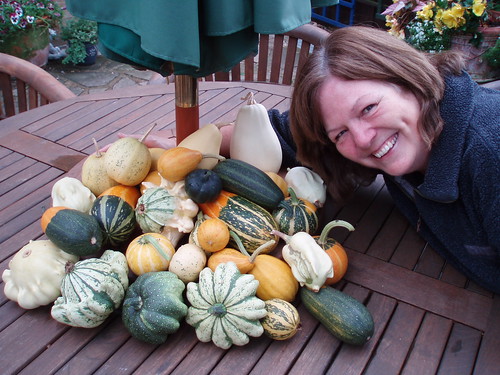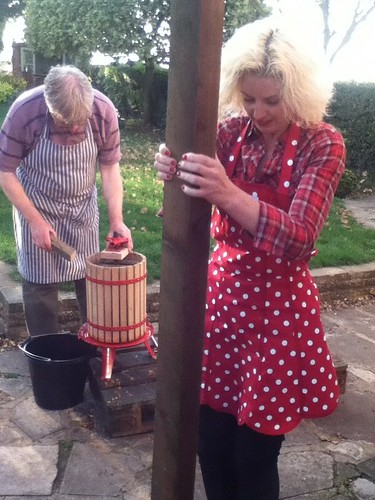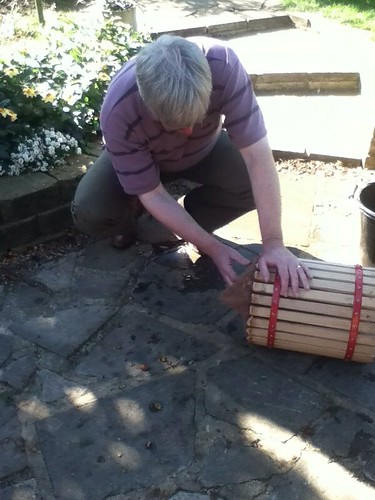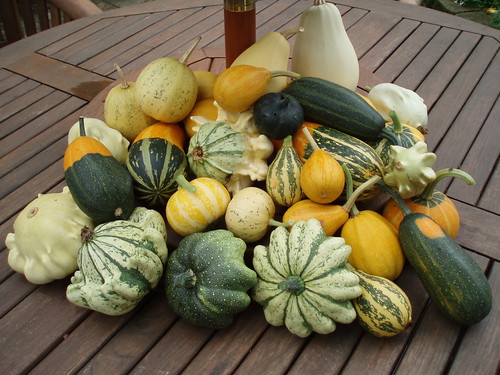It looks as if our splendid summer is over, the weather turned distinctly autumnal at the weekend, with daytime temperatures down to the low teens and a strong, cool northerly wind blowing. It was also raining quite heavily most of the weekend.
On Saturday, my focus was on racking the cider, but before we got around to that I was pottering around the garden and noticed that several gourd plants had withered and turned brown. The gourds were still hanging on, but it seemed only a matter of time before they detached.
Margaret has been itching to pick them for a month, so as soon as I suggested that we ought to harvest them, she was out there with her basket. It's been a good year for gourds, we've had a decent number and also a wide variety. The only disappointment is that the fruits have often been rather large - I would have preferred smaller and more numerous fruits. This year, I did mix some Growmore in the with compost in the pots and I wonder if that had any effect. Mind you, I also did that with my butternut squash and it didn't seem to make any difference there - they were very much on the small size.
 |
| Margaret with her gourd crop |
We've picked all the gourds from the three pots down the garden and just left some on the three pots at the side. These are still ripening and they haven't gone brown or withered yet. In fact, two of the plants are still growing and (even in the wind and rain) there were a couple of brave male flowers in bloom. They can have another week or two of ripening and hardening on the plant.
Cider has been much in mind this week. At the start of the week, I'd been concerned that the fermentation hadn't happened properly, but when I investigated, I found the specific gravity had fallen below zero and all the sugar had fermented. It had happened steadily, without much froth, but quickly (within seven days). The cider I tested was from the batch made with Crossland apples - it was bone dry and very acidic. The pressed juice had been sweet and quite delicious, but I wouldn't wanted to have drunk much of this lip-pursing liquid.
Advice on the cider forum was to use eating apples rather than cookers (but I used what I could get hold of and only one tree of eaters was available to three cookers). The recommended ratio of three parts eater to one part cooker was not an option. Other suggestions included artificial sweetener (Splendour seems to be the sweetener of choice), but most people said I should just give it time.
The harsh acidity in cooking apples is caused by an excess of mallic acid and, given time, this can be converted to lactic acid by means of malolactic fermentation where a naturally occurring bacteria gets into the cider and works its magic. As well as converting the sharp mallic acid to more palatable lactic acid, the process can also impart a spicy taste to the cider, which craft cider makers are very proud to achieve. Malolactic fermentation by natural bacteria won't work in temperatures lower than 15 deg C or in juice where acidity is below 3.2, so I think we're right up against it on acidity. Anyway, I've resolved to let my cider mature for six months and then taste test it. If it's still too acid, I can either use artificial sweetner or introduce a bacterial culture artificially to promote a malolactic fermentation. Apparently, cultured bacteria doesn't add spice, but it can give a pleasant buttery taste (I'm not sure I like the idea of buttery cider).
On Saturday I tested all barrels and all had completely finished fermentation. There was a marked difference between the three types. The windmill eaters have already produced a very nice cider, the blend of windmill cookers and Chris Smith's apples have produced a sharper, but very good drink and the Crossland cookers, which tasted so acidic at the start of the week, already seem smoother. So all juice was racked (the cider siphoned slowly off the sediment at the bottom of the barrel) and barrels were filled to exclude air and sealed. I'll leave them for a month or six weeks and then put them in the garage to mature over winter (I'll have to make some room).
We've enjoyed cider-making so far, it's been interesting and I like the idea of getting something for nothing. I have three full barrels (over 15 gallons) and five, one-gallon demijohns. I'd lose a gallon in the next racking, but I have around 95 litres and should end up with around 300 330cl bottles. I'm busy saving all the beer bottles that I can.
I might branch out into apple juice next year with the plan being to offer to pick people's apples, press the juice and sell it back to them as sterilised apple juice. We'll see how it goes.
 |
| Davina pounding the pulp, while I get the press ready for juicing |
 |
| Pulling the pressed pulp bag from the basket |
 |
| Starter yeast culture ready to be added to the juice |
On Sunday the rain was lashing down from the north and it was a pretty miserable day. We'd arranged to have lunch at Sam and Lucy's in Walthamstow and Holly was invited as well. Sam did lamb shank to a Hugh Fearnley-Whittingstall (a TV chef) recipe and it was nice. I got told off for being fussy and leaving some fatty bits - the story of my life.
Sam had also picked the gourds that Lucy has been growing and it was interesting to compare. Hers were smaller (a better size in honesty) and she also had some that we didn't, including a couple of knobbly green pear-shaped ones. We both had various sizes of bishop's hats.
It was pretty wet in London and so a planned walk didn't happen and Holly was a bit of a pain in the house for four hours. She travels really well in the car though, has a look out of the window for a bit and then, if we're going any distance, she just hunkers down for the duration.
We made good time there and back (less than two hours each way) and we were back by 6pm; in time to have a glass of wine and a few nuts sitting in the summer-house, listening to the rain lashing against the side. It sounds bonkers, but it did give Holly some outdoor time and I rather like the feel of sitting in a shed or tent and hearing the rain pelting against it.
We'd got an e-mail or Facebook post from Max to say he and Toby Knights had completed the Yorkshire three peaks (20 miles and 1600 metres of climb and descent) in under six hours. Considering the weather, that was very good going, or so it seemed to me. They're training for the OMM (Original Mountain Marathon) which is being held in a couple of weeks time.
Weekends seem to disappear in the blinking of an eye and before you know it your phone is bleeping to tell you it's 5am on Monday morning - time to get up for work. It was still raining a little this morning, or rather a fine, wet wind, which had come round to the south (through 180 degrees since Sunday). Only another nine weeks and I'll be finished work for good.

No comments:
Post a Comment